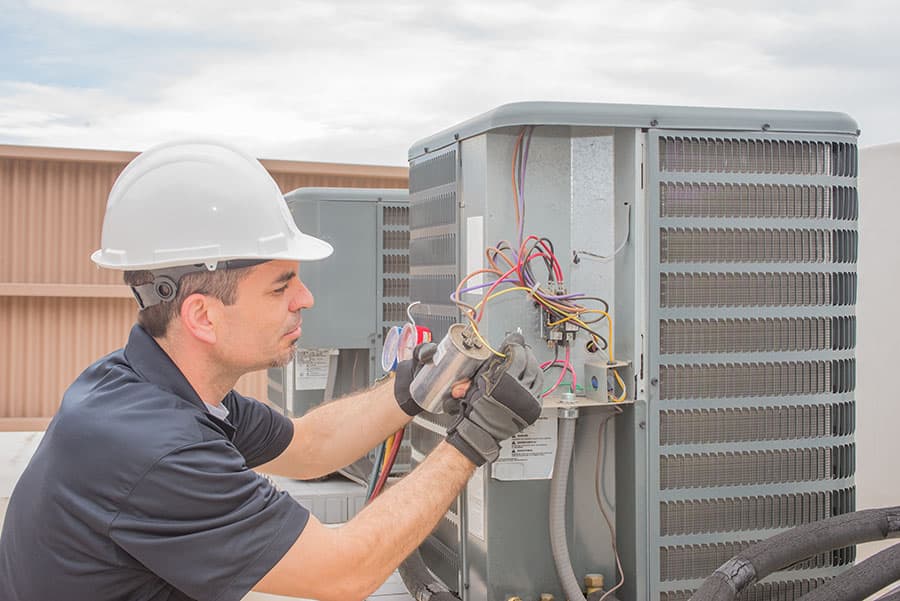Checking Out the Essential Components of an Effective Cooling And Heating System
An efficient cooling and heating system is built on several vital elements that operate in harmony. Each part, from the thermostat to the ductwork, plays a necessary function in preserving comfort and energy efficiency. Understanding these components is crucial for optimizing efficiency and improving indoor air top quality. As one analyzes these elements, the complex connections between them disclose understandings into improving overall system performance. What details aspects contribute most to this efficiency?
The Duty of the Thermostat in Cooling And Heating Performance
Usually forgotten, the thermostat plays an important function in the performance of A/c systems. This little device works as the main control center, managing temperature setups and making sure perfect convenience within a space. By precisely sensing the ambient temperature level, the thermostat interacts with the heating, air, and ventilation conditioning systems to keep the preferred environment
A reliable thermostat reduces energy usage by turning on the heating and cooling system just when essential, thus preventing extreme home heating or air conditioning. Modern smart and programmable thermostats enhance this effectiveness additionally by permitting customers to establish schedules and remotely adjust settings, adapting to everyday routines.
The placement of the thermostat is necessary; inappropriate place can lead to unreliable temperature level analyses, resulting in ineffective operation. In general, a well-functioning thermostat not only enhances comfort but also contributes significantly to energy savings and the longevity of the HVAC system.
Recognizing the Importance of Air Filters
Air filters offer an essential feature in cooling and heating systems by assuring that the air distributing within a space remains tidy and healthy and balanced. These filters catch dust, irritants, and various other pollutants, stopping them from being recirculated throughout the atmosphere. By capturing these particles, air filters add to boosted indoor air high quality, which can substantially benefit passengers' health and wellness, particularly those with allergic reactions or breathing conditions.
In addition, preserving clean air filters improves the efficiency of HVAC systems. Stopped up filters can restrict air movement, triggering the system to function more difficult to maintain preferred temperature levels, bring about enhanced power usage and greater utility costs. Consistently replacing or cleansing filters is an important upkeep action that can extend the lifespan of a/c equipment. Eventually, understanding the value of air filters allows property owners and structure supervisors to take positive actions to guarantee a well-functioning, effective cooling and heating system that promotes a comfy and secure interior setting.

The Capability of the Heating System and Warmth Pump
Furnaces and heatpump are crucial parts of cooling and heating systems, in charge of supplying heat throughout chillier months. Heaters operate by heating air via burning or electric resistance, after that distributing it throughout the home using ducts. They commonly provide quick home heating and can be fueled by gas, electrical energy, or oil, relying on the system type.
On the other hand, warm pumps move warmth rather than generate it. They extract warm from the outside air or ground, also in reduced temperature levels, and move it indoors. HVAC experts. This double capability permits heat pumps to also supply air conditioning in warmer months, making them functional alternatives for year-round environment control
Both systems need appropriate upkeep to ensure effectiveness and long life. While heaters master extreme cold, heatpump can be beneficial in moderate climates. Understanding their distinct functionalities aids property owners in selecting the most suitable alternative for their home heating requires.
Checking Out the A/c System
The cooling device is an essential part of cooling and heating systems, readily available in numerous types to fit different demands. Recognizing the effectiveness scores of these units is important for making informed selections concerning power usage and cost. This area will certainly check out the diverse sorts of a/c and clear up how efficiency scores influence efficiency.
Sorts Of Air Conditioners
While different factors affect the option of air conditioning systems, understanding the various kinds available is essential for property owners and building supervisors alike. Central air conditioning conditioners are developed to cool whole homes or buildings, utilizing a network of air ducts for air flow. Window devices provide an even more local service, perfect for solitary rooms or tiny spaces. Mobile ac system provide adaptability, allowing individuals to move the system as required. Ductless mini-split systems are another choice, combining the effectiveness of main systems with the benefit of zoning, as they call for no ductwork. Geothermal systems harness the planet's temperature level for energy-efficient cooling. Each type features distinct advantages, making educated selections vital for efficient environment control.

Efficiency Rankings Discussed
Recognizing effectiveness rankings is vital for picking the best cooling unit, as these metrics supply understanding into the system's efficiency and energy usage. One of the most common score for air conditioning system is the Seasonal Energy Performance Proportion (SEER), which measures the cooling outcome throughout a typical cooling period separated by the total electric energy input. A higher SEER suggests far better efficiency. Additionally, the check this site out Energy Effectiveness Proportion (EER) is made use of for measuring efficiency under certain conditions. Another vital metric is the Power Star accreditation, which indicates that an unit satisfies stringent energy efficiency standards. By evaluating these ratings, consumers can make informed choices that not just maximize convenience yet additionally decrease power expenses and environmental influence.
The Relevance of Ductwork and Air flow
Efficient ductwork style this and airflow monitoring play crucial roles in the general performance and performance of a/c systems. Correct ductwork warranties that conditioned air is distributed uniformly throughout a space, lessening temperature level variations and enhancing convenience. Well-designed air ducts reduce resistance to airflow, minimizing the work on cooling and heating devices and eventually decreasing power intake.
Airflow management entails purposefully putting vents and signs up to boost the flow of air. This prevents usual problems such as cold or warm areas, which can occur when airflow is blocked or inadequately well balanced. In addition, the best duct products and insulation can better improve efficiency by reducing warmth loss or gain during air transportation.
An effective ductwork system not only adds to energy financial savings however can also extend the lifespan of HVAC devices by decreasing unneeded strain (HVAC experts). Understanding the relevance of ductwork and air movement is necessary for achieving peak A/c system efficiency.
Regular Upkeep Practices to Enhance Performance
Routine upkeep practices are necessary for ensuring peak performance of cooling and heating systems. These practices include regular examinations, cleaning, and needed fixings to keep the system running efficiently. Regularly changing air filters is crucial, as clogged up filters can obstruct airflow and minimize performance. In addition, service technicians need to examine and clean evaporator and condenser coils to stop getting too hot and power wastage.
Annual expert assessments are also recommended, as skilled professionals can recognize potential problems prior to they rise. Oiling moving components lessens damage, adding to a much longer life-span for the system. Moreover, ensuring that the thermostat operates correctly aids in maintaining perfect temperature control.

Often Asked Concerns
Exactly how Commonly Should I Change My Thermostat?
Thermostats need to typically be changed every 5 to one decade, depending on use and modern technology advancements. Regular checks are advisable to assure peak efficiency, specifically if experiencing irregular temperature control or boosted energy expenses.
What Size Air Filter Is Ideal for My HVAC System?
The ideal dimension air filter for a cooling and heating system differs by system style. Normally, it's crucial to speak with the owner's guidebook or examine the existing filter dimensions to guarantee peak efficiency and air high quality.
Can I Set Up a Heatpump Myself?
Mounting a heatpump separately is possible for knowledgeable people, but it calls for understanding of electrical systems and neighborhood codes. Working with a specialist is suggested to guarantee correct setup and ideal system efficiency.
How Do I Know if My Ductwork Is Reliable?
To figure out ductwork efficiency, one need to look for leaks, action airflow at vents, evaluate insulation high quality, and review temperature distinctions between supply and return air ducts. Professional evaluations can provide detailed insights right into overall efficiency.
What Are Signs My Cooling And Heating Requirements Immediate Upkeep?
Signs that an a/c system needs instant upkeep consist of unusual these details sounds, irregular temperatures, boosted power bills, unpleasant smells, and constant cycling. Attending to these concerns quickly can protect against further damage and assurance optimal system performance.
Air filters serve a necessary feature in Heating and cooling systems by assuring that the air flowing within a space remains healthy and balanced and tidy. Additionally, maintaining clean air filters improves the effectiveness of Cooling and heating systems. Ductless mini-split systems are another option, integrating the effectiveness of main systems with the ease of zoning, as they call for no ductwork. Recognizing efficiency ratings is important for choosing the ideal air conditioning system, as these metrics supply understanding right into the system's efficiency and power usage. The finest dimension air filter for an A/c system differs by system design.